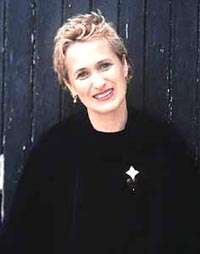Cannes' only woman film director shows flick about ladybug
When Jane Campion was honored onstage at the Cannes Film Festival with about 30 other major directors, she was the lone woman of the bunch. And she's still not used to how strange that feels.

The New Zealander is the only woman filmmaker to have won Cannes' top prize, for "The Piano" in 1993. This year at Cannes, she showed a fantasy short film about a ladybug - a woman dressed up in an insect costume - who gets stomped on in a movie theater. She said it was a metaphor for women in the film world.
"I just think this is the way the world is, that men control the money, and they decide who they're going to give it to," Campion said, explaining why so few women get movies made.
Cannes, like the film world in general, is short on female directors. Of the 22 movies in the running for the top prize this year at Cannes, only three were made by women.
Graphic novelist Marjane Satrapi co-directed the screen adaptation of "Persepolis," the tale of her rebellious coming of age after the Iranian revolution; Japan's Naomi Kawase is here with road trip story "Mogari No Mori" ("The Mourning Forest"); and France's Catherine Breillat directed "Une Vieille Maitresse" (An Old Mistress), a period piece about the ups and downs of arranging a marriage between a libertine and a virtuous young aristocrat.
Women have made some high-profile appearances here lately. Last year, Sofia Coppola took "Marie Antoinette" to Cannes, and in 2005, U.S. filmmaker Miranda July won an award for best first-time filmmaker for "Me and You and Everyone We Know."
But parity is a long way off, at Cannes and across the Atlantic in Hollywood. A survey released last year said U.S. female directors made only 7 percent of the 250 highest-grossing films in 2005. Martha M. Lauzen, the San Diego State University professor behind the study, called her report "The Celluloid Ceiling."
Campion, 53, is one of only three women ever nominated for an Academy Award for best director, along with Coppola ("Lost in Translation") in 2003 and Lina Wertmuller ("Seven Beauties") in 1976. Campion was nominated for "The Piano," her account of adultery set in New Zealand in the 1850s.
Campion was at Cannes this year as one of 35 directors invited to make a film short for Cannes' 60th anniversary edition. When the group went onstage together Sunday, Campion was the lone women in a sea of directors that included Roman Polanski ("The Pianist"), Gus Van Sant ("Elephant"), Wong Kar-wai ("In The Mood for Love"), Alejandro Gonzalez Inarritu ("Babel") and Atom Egoyan ("The Sweet Hereafter").
Egoyan told Campion afterward that he admired the female vantage point in her movie's sex scenes - especially the steamy scenes from the Meg Ryan thriller "In the Cut," which he called "some of the most erotic material I've ever seen."
But Campion said some men are "shocked" by that female perspective.
"They see that women have a different way of seeing the world altogether," she said.
Campion's next picture is the story of poet John Keats' romance with his young neighbor Fanny Brawne, a love story that was cut short when he died at age 25. Campion plans to tell the story from Brawne's point of view.
"When I think of what's fantastic about women, it's their generosity, their intuitiveness, their capacity to trust emotions, to be emotional, to nurture, to promote peace, to care about the planet's environment so their children can inherit it," she said. "Those qualities aren't sexy for guys, but (they're) quite natural in women."
Subscribe to Pravda.Ru Telegram channel, Facebook, RSS!




